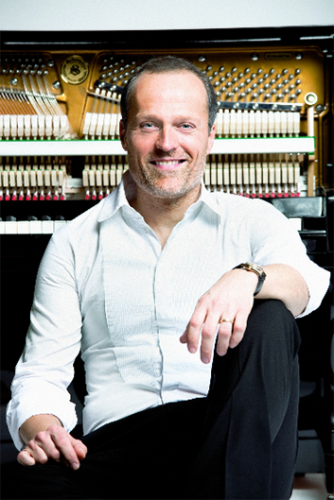A full time researcher in university and an amateur art commentator, Cheong obtained his master’s degree in Public Policy at Willy Brandt School of Public Policy at the University of Erfurt and is formerly a clarinettist of the Erfurt Philharmonic Orchestra in Germany. He loves classical music and now serves as conductor of the orchestra in Escola Choi Nong Chi Tai, by which he can connect art to everyday life. Cheong is also a book lover.

German pianist Joja Wendt Photo courtesy of Tsinghua University Arts Centre
Last year, Tsinghua University invited Joja Wendt, a German pianist, to give a piano concert, “Around the World in 88 Keys” at the New Tsinghua Xuetang, which proved very popular with the children. Performing to the audience of over 1,500 persons, Wendt delivered a most impressive concert. A complete opposite to the sort of over-formal performance one might associate with classical music, Wendt gave a light-hearted and friendly show, making music appreciation more accessible than ever. Indeed, the audience was invited to interact with the music. This event brought to mind some similar shows by Raymond Chan Wai Man, a Macao-based musician, whose concert series, “Comedia de Musica Classica” in recent years have done much to promote classical music appreciation. His show last year, which features collaborative cross-over with Cantonese opera, was a great hit. These performances by Wendt and Chan illustrate that music can be made much more accessible to the audience if interpreted in a more refreshing way, especially through collaborations. At the same time, they made it easier to appreciate classical music as an art form that draws from life. In other words, with an effective platform or interpretation in place, classical music can feel more connected to our everyday lives and be widely promoted.
Lasting over two hours, Wendt’s concert was filled with laughter, singing and joy, as the audience took part in the music-making. Influenced by the piano blues of Boogie-Woogie, his music is more palatable and invites interaction given the all-time popularity of jazz music. Wendt also took care to explain the way he engaged with different instruments to enhance his music performance. For example, he used his “gigantic palm” (with an arc spanning 12 degrees) when performing Rachmaninov’s music. While other pianists will make use of professional musical instruments, the humorous Wendt decided to achieve the effect with a wooden stick, so that the audience could better understand how powerful and immense is a pianist’s hand. Moreover, he recounted his days learning the piano as a child, when he would make up stories using piano long before he could navigate the piano keys. In the concert, he led the audience into his childhood memories, encouraging them to make up music together by playing the piano impromptu, in the same way as he used to make up a “horror story” with his siblings. The pianist confessed that this kind of process helped him understand the meaning of music: the way a different sound can articulate one’s inner feeling.
Wendt’s virtuoso is empowering not because of the performance in itself. Rather, it lies in the artist’s ability to create music together with the audience. This reveals the most important value in music, in its possibility to express people’s inner feelings and dreams. After all, the complexity of human feelings means that not everything can be put down in words. Art is therefore a way for us to express what lies beyond words. In this sense, it does not matter whether the nature of the musical piece is elegant or not. Instead, the significance of the work resides in its expressive power that transcends languages and bridges the gap between feelings and words.
The richness of Beijing’s art scene reflects a new era when the steady economic developments in China have changed the lives of the middle classes, who begin to enjoy a better living standard and pursue higher fulfillment in life. Despite the fact that the capital attracted many international tour groups to stage their works, there is room for more improvement to the city’s infrastructures. For example, there is a lack of translation support for performance groups, as evident in the poorly translated speech of Wendt, which made it hard for the audience to appreciate what the artist actually said. This is not to say that the translator did not prepare his notes well, but there were instances when the pianist made some impromptu remarks, which proved challenging for the translator to grasp. As a result, the effectiveness of the performance was undermined. If only the music performances could be backed by more quality simultaneous interpretation support. After all, the surge in international performance tours taking place in Beijing has made this need more pressing than ever.